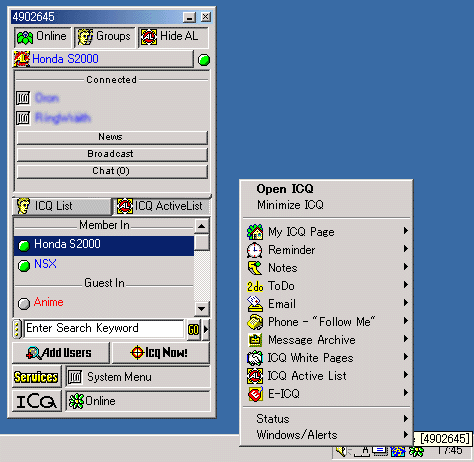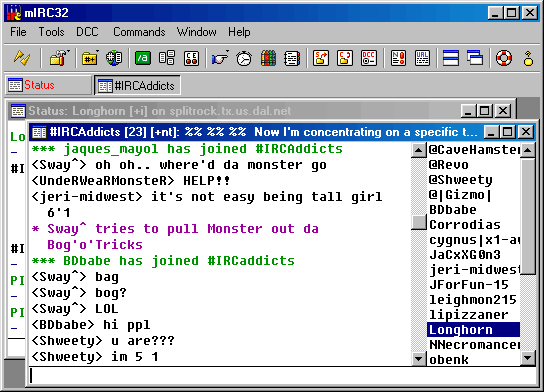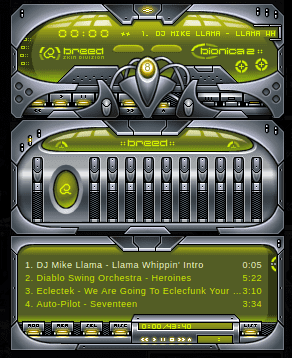> make world_
The internet sucks
It's 1997. It's Friday night and the phone line is open. Connect with me and let's chat about the internet.
There is no Google. Search engines were glorified yellow pages. In fact the search function was useless enough that it made sense to use the directory function, and look for things based on clicking through categories and sub categories. I liked alta vista. Some people liked ask jeeves. Jeeves was not an AI, really it was just a marketing gimmick. Jeeves wasn't even an algorithm. Neither Jeeves nor Clippy nor Bonzi Buddy could help you. You were on your own on the internet in the 90s. So how did you find something?
Well the good stuff was not really on the search engines. You see the Web of the 90s wasn't the whole story. There were other protocols too. Other things like the web that were global to the internet and open for anyone to use, but not a website or an application. There was POP ( post office protocol) and SMTP (simple mail transfer protocol). These e-mail protocols were implemented by what you would call a mail client. This was the application. You could choose your mail client (app) that you liked and set it up the way you wanted to. But did we chat in the 90s? Absolutely, but there was no single app and you picked your app. You could be on Aim (AOL instant messenger), MSN (The Microsoft one) or ICQ (read the letters to yourself aloud) and still choose to use an application that wasn't built by the vendor, but could connect to its network.

These were not all open protocols, but the protocols would be reverse engineered and you could use any app you wanted that supported them, including some apps that brought more then one protocol. So you would be able to see and interact with people on different "apps". That was instant messaging.
There was also general chat, which was well known via its protocol: IRC. Unlike whatsapp or telegram, IRC was an open protocol that anyone could build an application for, and there were many. For a long time my favourite was mIRC.

You might be thinking "boy that looks terrible" but you would be wrong. Strangers from all over world got together to just chat. Moderators would make sure things remained civil. You could connect to different servers that would have all kinds of different channels (chat rooms) that you could join. There was a global conversation going on via text over the internet in the 90s facilitated by the IRC protocol. Because it was open, anyone could build an "app" in IRC. They were called bots. Not all of them were friendly, but a lot of them were. You could play games, share files or listen to music together. in fact, mIRC scripting was where I started programming! The scripting language was so flexible you could build anything, change anything. What you see is certainly not what you got with mIRC or IRC. It was a universe of its own just like the web is. It was completely separate from the web.
There were many shortcomings to IRC. I won't pretend that it was all sunshine and ice cream. Security was one of the biggest issues. The only way you could have a really safe conversation was via DCC (direct connection chat). Despite its shortcomings it had so much that is completely lost to the internet of today. It was fun and it encouraged and attracted innovation. Can you build an app or a bot for today's chat services? Well kind of but it depends on what a company decides they will allow you to do. The protocols are no longer open for the most part, and you can't build your own WhatsApp client that will make it possible for you to communicate with friends on WhatsApp. The protocol is not open. It is owned by Facebook. You can do whatever you like as long as Mark is okay with it.
The internet of the 90s meant you could choose your applications (called clients for internet services), and the servers and the protocols were open. I wonder if some youngsters even know you can use Outlook to connect to your gmail account. I wonder if this is even still possible. But mostly just remnants of these protocols remain. For the most part everything you do has to be blessed by a multibillion dollar corporation. And why would they really care what your needs are?
If you wanted to play music you could download songs (although not legally). It would take about one hour for a song to download. More commonly, people would "rip" their CDs (convert the CD tracks into mp3 files) and then store the mp3 songs on their hard drives. The great thing was: You could choose your music player. Different ones had different things to offer. Winamp was the favourite because it had all kinds of crazy skins and visualisations which were trippy 3D effects that would move to the beats of your music. Your music player and your skin said something about you. About your preferences. Your choices.

The point was that everything about computers and the internet was about your choices as a netizen (internet user). But dark clouds were forming.
If you want to ruin anything, then just add corporate greed. Corporations were already getting bent out of shape about people ripping their CDs and sharing music with their friends. They were already getting angry about how the internet was. Technology companies didn't like the fact that we could choose which application we used to access something, because they did not control it. It was basically too communist for them, because all these corporations realised they could make ALL the money if they controlled the internet. Gradually things took a turn for the worse.
If I look back now, it's very depressing. If you want to change how your music player looks or works, you will need to buy a subscription with another music service, and then all your playlists will have to be migrated, if they can be. The corporations know you don't want to do that. Effectively their music player gives you a play button and a few other neat tricks, but it doesn't come close to what music players in the 90s gave you. How could that even be? In winamp it was possible to change the way that shuffling worked and there were plugins to do all kinds of things with your music. Now you get a play button, a shuffle button and a massive list of things "selected for you" on the "home" page. That isn't always what you want or is it? Regardless, you don't get to have the choice. There is zero innovation in how the music is presented to you or played. The artists aren't better off. I can tell you that. When covid was in full swing there were donate buttons in Spotify. This is because even though most of us were working from home and the music carried us through those hard times, Spotify did not care enough to pay artists enough for them to put food on the table. Even though teens in the 90s ripped, copied and downloaded, everyone still bought CDs.
If you want to communicate with someone in 2023, you have to know which app they are using. Each app has its own proprietary protocol and the big ones are owned by companies with lots of money. Want to chat to someone on Microsoft Teams? You need the teams app. Whatsapp? That's an app too. We communicate with each other through big corporations, and they get to decide the experience, what we can and can't do, which features we should or shouldn't have, how it looks, where it works and what it costs. We walked backward from a state where we could choose every single one of those things. This has made the internet a confusing mess of websites and apps.
Video was not really a thing on the internet, since downloading video files was too intensive for the most part. Streaming them was not a pleasant experience. If you wanted to watch a movie in the 90s, you had to go to video store and pick one if it was available and not rented out. That process was actually quite pleasant. Now you have to open multiple different apps to see if the movie you want to see is on any of them, and then you have to watch it on that "service" regardless of how you feel about it. If you wanted to watch a movie later in the 90s, you could reserve it at the video store. Now when you pick something to watch later it could just up and vanish from the streaming service where it was supposed to be. How did movies literally get worse than driving to a video store? Why are actors and writers striking together? It's because of corporate greed. Not only can you not choose what to watch anymore, because it might not be where you last saw it, the creative people who make the shows and movies we enjoy are also short changed.
I'm not going to argue that things were more convenient in the 90s, that's not true. What we did have back then was choice. Choice has been slowly chipped away at by corporate greed, forcing us into narrower and narrower corridors of the internet. The internet used to be a wide open space full of possibility and freedom. Now it's essentially a glorified mall where the entire experience is controlled by someone trying to sell you something. There is nothing wrong with a mall per se, but we need to think about whether we want the way we communicate and engage with cultural artifacts to be solely through the lens of profit. We know that the anti-social networks that destabilise entire countries became that way because the idea that "engagement" was more important than truth or quality of content. That detail was exploited by bad actors with devastating effect. The internet went from the place that started the arab spring to pizzagate. Because of corporate greed.
